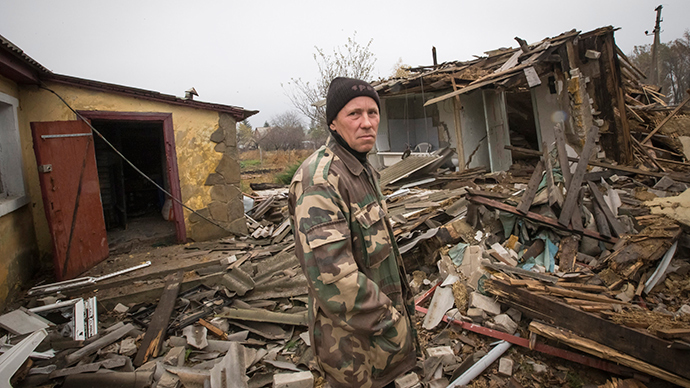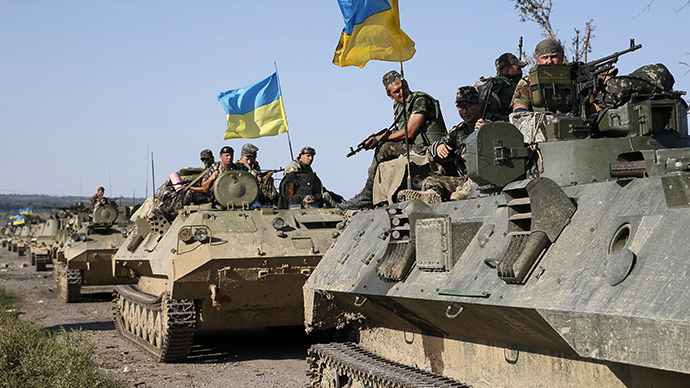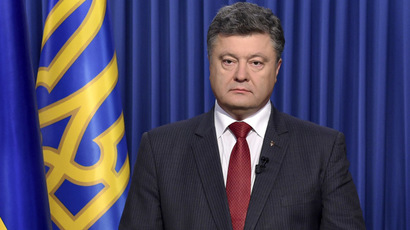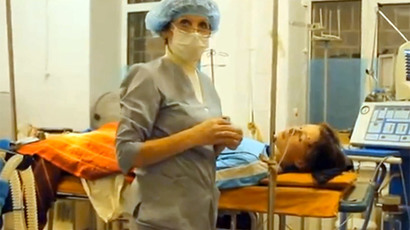Moscow to Kiev: Stick to Minsk ceasefire, stop making false ‘invasion’ claims

Russia has called on Ukraine to stick to the Minsk peace process and disproved claims that Russia is deploying additional troops on the border. Kiev has again accused Russia of invading Ukraine, but has not produced any proof.
The calls from Russia come as tension is rising in eastern
Ukraine, and rebels say Kiev is preparing to break the ceasefire
and resume hostilities.
Amid the threat of escalation, Russia is calling for a new round
of talks in the Belarusian capital, Minsk.
“We call for the Minsk process to continue and for a new
gathering of the contact group,” Russian presidential
adviser Yury Ushakov said Friday.
Negotiations in Minsk managed to produce a shaky ceasefire in
early September, which has mostly held until now. They didn’t
stop the violence altogether, as some flare-ups occurred on the
border between areas controlled by Kiev loyalists and rebel
forces, such as the fighting over the ruins of Donetsk
international airport. But the violence was reduced.
The calls come after Ukrainian Prime Minister Arseniy Yatsenyuk
called this week to abandon the Minsk talks altogether and go
back to the Geneva negotiations format from April. Unlike the
Kiev talks, the talks in Geneva did not include representatives
of the rebel forces.
“Sitting [down] with them for bilateral negotiations is
useless,” Yatsenyuk said. “One of the most efficient and
real formats is the Geneva format, which included the
participation of the US, the EU, Ukraine and our geographically
northern neighbor.”

The “northern neighbor,” as the Ukrainian PM referred to
Russia, argued that the agreement that the Geneva format produced
in April failed to stop the violence, because Ukraine never even
started to implement the accord and instead of the political
reform the agreement called for, sent its troops to shell rebel
cities.
The exchange comes as amid expectations of a possible resumption
of hostilities in Eastern Ukraine. Rebels reported a large
build-up of Ukrainian troops near the separation line and said
they expected a massive attack at any time. Kiev said the
allegations were lies.
The rebels have good reasons to suspect foul play from Kiev,
considering that a number of high-ranking Ukrainian officials
have stated that use of force in the east was needed. The latest
statement came Thursday from Markiyan Lubkivskiy, an aide to the
head of Ukraine’s Security Service.
“I believe that sooner or later we will have to start very active
actions,” he said on Shuster Live, Ukraine’s main TV talk
show on politics.
Earlier, Yury Lutsenko, an aide to Ukrainian President Petro
Poroshenko, said Kiev’s interest in the ceasefire was to win time
to regroup its troops.
“We need to maintain the ceasefire as long as we can to get
our precise instruments, to get military and financial aid from
the West,” he said last month. “We are the ones
benefiting from the ceasefire and peace.”

Accusations of an escalation of tensions have also come this week
from Kiev. On Friday a spokesman for the anti-rebel campaign,
Andrey Lysenko, claimed that Russia has sent 32 tanks, 16
howitzers, 30 trucks of ammunition and three trucks with radar
equipment to rebel-held areas. He offered no evidence of his
claim, however.
Kiev has also accused Russia of deploying additional troops along
its border with Ukraine this week. The reports even prompted
Canadian Foreign Minister John Baird to condemn Russia on
Wednesday.
“We strongly condemn these provocative actions by Russia, and
we believe this is further proof that the Kremlin only seeks to
hamper the peace process in Ukraine,” Baird said in a
statement.
This provoked a sarcastic response from the Russia Defense
Ministry, which said the reports were not true and that Canada
should address its concerns to those producing the rumors, rather
than to Russia.
“All such provocative ‘reports’ aimed at further escalating
the tension over the civil conflict in southeast Ukraine have a
single source. The source is not Ukrainian, although it currently
operates from one of the governmental buildings in Kiev,”
the statement said, apparently alleging to the heavy presence of
American personnel in the Ukrainian Security Service.
Tensions in Eastern Ukraine are also on the rise after the
self-proclaimed Donetsk and Lugansk People’s Republics held
elections last week.
Ukraine and its sponsors branded the ballot an irrelevant mockery
and a violation of the Minsk agreement. Russia said it respected
the choice of the people living in the breakaway regions, but
stopped short of formally recognizing them, a move that
Washington said would lead to further economic sanctions against
Russia.














